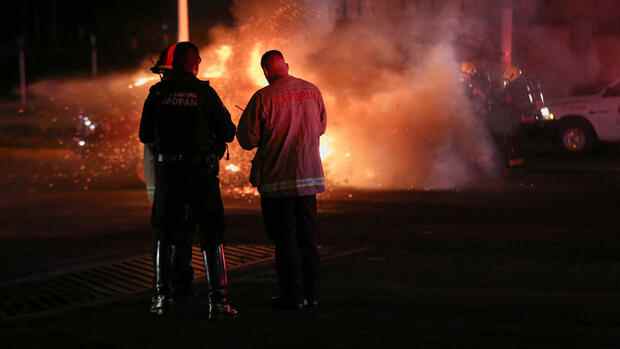Mexico City Organized crime has a firm grip on Mexico’s economy, albeit indirectly. In Michoacán in western Mexico, avocados destined for export to the United States were left lying on trucks last week. At the same time, in Chihuahua in the north of the country, scores of workers did not go to their factories for several days. In the popular tourist state of Baja California on the Pacific coast, shops remained closed.
People were afraid of being caught in the crossfire or in the direct focus of the cartels. Within days, criminal groups torched cars, closed roads and set shops on fire in major cities across the country. In Ciudad Juárez, members of the “Los Mexicles” gang shot at the population indiscriminately. Eleven people died there in one day, including a family in a pizzeria and a radio crew trying to report on the aggression.
Organized crime, known as “narco” for short in Mexico, does whatever it wants in the regions controlled by the cartels. The state is helpless, soldiers are hiding, as are the police.
President Andrés Manuel López Obrador commented on the week of violence stoically and almost resignedly: “We haven’t seen anything like it before, hopefully it won’t happen again that innocent civilians are attacked.” Words that sound like a capitulation of the state to the “narco”.
Top jobs of the day
Find the best jobs now and
be notified by email.
The economy, which has been silent for a long time, is now sounding the alarm. According to José Medina Mora, president of the employers’ association Coparmex, the insecurity in Mexico costs the equivalent of one percent of gross domestic product (GDP). “This is a high price for the Mexican economy, which is reflected in the fact that less investment is coming and no jobs are being created,” complains Medina Mora. Mexico’s GDP was $1.3 trillion last year, around a third of Germany’s GDP.
German companies are concerned about security
German entrepreneurs are also concerned about the violence in the country. The managing director of the German-Mexican Chamber of Industry and Commerce (AHK Mexico), Johannes Hauser, warns of lasting damage to Mexico as an investment location if development continues unabated. “The wave of violence shows that the drug cartels are putting up with the death and injury of civilians. And it drives up the costs of companies,” he emphasized in an interview with the “Handelsblatt”.
German companies in the country are increasingly investing in their security. In addition, they are restricted in their activities. “We are aware of companies that have temporarily stopped their business trips to regions affected by violence,” says Hauser. In Mexico there are 2,100 companies with German capital that employ 300,000 people.
Every day around 100 murders are committed in Mexico, more than 100,000 people are missing, 33,000 disappeared under the current government alone. 14 reporters have already been murdered this year. Violence in Mexico, one of the largest formal democracies in the world, is spiraling out of control.
Currently, Mexicans are experiencing an excess of attacks, bombings, shootings, executions and wanton destruction by organized crime. Even experts are perplexed.
Under the current government alone, tens of thousands of people have disappeared.
(Photo: dpa)
So does the think tank Save Democracy, which works on the development of democracy in Latin America: “We are witnessing a tragedy that is robbing people of peace and preventing the development of Mexico’s democracy.”
>> Read here: Emerging markets under pressure: Capital is withdrawing
Even under López Obrador, there are no “effective government measures to combat and prevent the growth of criminal networks,” writes the organization. Crime experts and political analysts are already warning of a Mexican “narco-terrorism”.
The new outbreak of violence differs from previous ones in that the armed groups are no longer just fighting each other or taking action against the security forces. This time they are terrorizing the civilian population, knowingly or negligently.
Prevention against violence failed
López Obrador was also elected in 2018 because he promised to put an end to violence and fundamentally change the approaches to crime fighting of his predecessors. In particular, President Felipe Calderón, who ruled between 2006 and 2012, tried to bring the cartels to their knees with the help of the armed forces. This failed, however, and instead led to more bloodshed.
The government’s concepts against organized crime have so far had little success.
(Photo: Reuters)
The new president, on the other hand, came up with a completely different approach: “Abrazos no balazos”, i.e. “hugs instead of bullets” – a concept that relied on prevention instead of repression and above all on offers to young people so that they do not get involved in organized crime slide.
Among other things, scholarship offers and penalties for minor offenses were part of the approach. However, this tactic also failed.
>> Read here: UN report: Mexican cartels are increasingly using cryptocurrencies for money laundering
Crime syndicates and local gangs in many parts of the country have taken advantage of the fact that López Obrador largely avoided military confrontation. Larger and larger parts of Mexico are in the hands of the cartels.
The business association Coparmex is alarmed: “The situation is unsustainable and the lack of an effective strategy against the uncertainty, coupled with the indifference at all levels of government, aggravates the situation every day.”
More: There is an abundance of wind and sun in Mexico – but the government relies on fossil fuels
